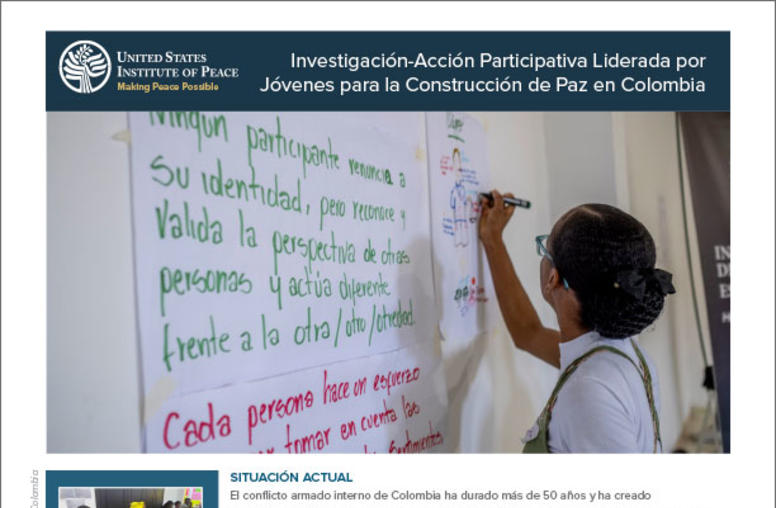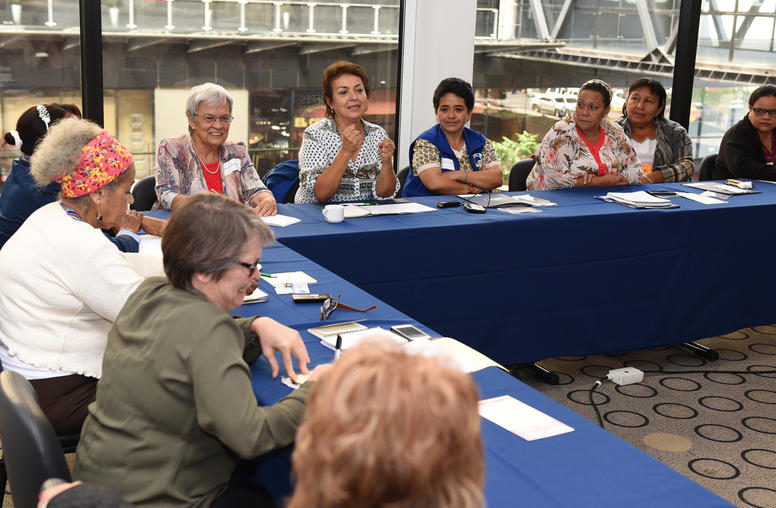Q&A: Colombia, Guerrillas Reach Accord on Rights for Victims of War
On the Issues With Virginia "Ginny" Bouvier
Making a peace deal that accommodates the needs of the millions of civilians hurt by Colombia’s 50-year-old conflict has challenged negotiators since talks between the government and the nation’s largest guerrilla group began three years ago. This week, negotiators announced an agreement on victims, completing the fourth item on a six-point agenda that’s aimed at ending hostilities. USIP’s Virginia Bouvier, who was in Havana for the declaration on victims, said the latest accord is another historic step toward bringing peace to Colombia.
In a nutshell, what happened this week at the negotiating table in Havana?
There are 7.6 million registered victims of the conflict in Colombia and the question of how to address their needs has hung over the talks from the beginning. This week, the government and the Revolutionary Armed Forces of Colombia unveiled a sweeping, final accord on the issue that includes mechanisms for compensation, forums for judging war crimes, a commission to help locate people who have disappeared and more.
Victims of the war have played a groundbreaking role in the Colombian peace process. Were they satisfied with this agreement?
The negotiators received more than 17,000 proposals from war victims, and their testimonies made a significant impact on the talks. There was a deeply moving ceremony at the negotiating table in Havana this week in which 10 individuals who suffered from the conflict participated. They were seated at the negotiating table behind name plates and candles. The Cuban violinist José Luis Rubio performed Franz Schubert’s “Ave María,” and a moment of silence followed. Later, Jineth Bedoya, a well-known journalist, victim of sexual violence and a leader in Colombia campaigning to end violence against women, read a communiqué affirming the role of the victims as monitors of the peace process. Bedoya noted that the victims had not been privy to the deal before coming to Havana.
The outlines of what you’ve described in the accord sound similar in many ways to the agreement on transitional justice reached in September.
The September accord telegraphed to a large degree what happened this week. This agreement fills in many details and mechanisms while introducing a broader architecture of institutions to establish peace and help those who have been injured by a half-century of war.
Let’s get into some details, then. What’s in the agreement?
First of all, it explicitly seeks to ensure the rights of victims through what’s called an Integrated System of Truth, Justice, Reparations, and Non-Repetition — the assurance that they won’t be victimized again. It’s an innovative system that will reward people for telling the truth and assuming responsibility for participating directly or indirectly in the conflict and involvement in violations of human rights or international humanitarian law. Importantly, from the victims’ standpoint, the parties promise that there won’t be an “exchange of impunities.”
What, exactly, comprises this “integrated system”?
One arm of it is judicial. This includes a special tribunal for peace and justice courts, which has jurisdiction over all those who directly or indirectly participated in the conflict. It was announced somewhat prematurely on Sept. 23. The joint communiqué of the guerrillas and the government, and the 63-page agreement that accompanied it this week, clarifies the powers, duties and structure of the tribunal. Particularly contentious items included the terms for the appointment of the judges and the tribunal’s jurisdiction over ex-presidents. There are still some minor points that have been added to the other still-pending items from earlier agreements; these issues are on the back burner for further consideration.
How will the special tribunal operate?
Well, it presumes the innocence of those charged. There’s no amnesty for war crimes, crimes against humanity, and genocide by guerrillas as well as state agents or other parties, who will be investigated, prosecuted and punished. There can be “effective restrictions of liberty and rights” for five to eight years with verification for those who fully confess their crimes; jail time of the same duration for those who belatedly confess, and 15 to 20 years in prison for those who don’t come clean. Where and how the so-called liberty restrictions will be imposed hasn’t been specified, though government negotiator Humberto de la Calle noted that there would be an appropriate monitoring mechanism “according to the particularities of each case.”
Anything else in the judicial arm?
For “political” and “related” crimes, the accused will be offered the “broadest possible” amnesty and pardons, which conforms with standards of international law. Political crimes include rebellion, which traditionally has received amnesty under Colombian law. Related crimes will likely include drug trafficking and other offenses committed in the service of the rebellion. There’s also a new unit for investigating and dismantling criminal organizations, including those that emerged following the demobilization of paramilitary groups and their networks.
What’s on the non-judicial side for victims?
There are provisions for a Commission for Clarifying Truth, Harmony and Non-Repetition; a special unit to locate people who disappeared in the conflict; and reparations that appear in other parts of the peace accord, such as those already reached on rural development, political participation, and cultivation of illicit crops, that will favor the populations and territories most affected by the conflict.
Where does the peace process go from here?
The parties have tabled until next year the terms for a bilateral ceasefire and ending the conflict, as well as the mechanisms and procedures for endorsement, verification and monitoring the agreements. This accord was hard to get, but it demonstrates a strong will to work together and bodes well for producing a final agreement in the new year. I think meeting the March 23, 2016, deadline woud be a minor miracle given all that’s left on the table, but a peace deal is clearly within sight.



